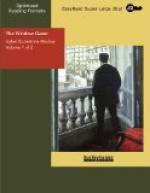“Know the old Doc. well?” he inquired. “Queer old duck, eh? And that Li Ho is about the most Chinky Chinaman I ever seen. Come to think of it, I never paid him back that gas I borrowed.”
“Hasn’t he been across lately?” asked Spence, controlling his voice.
“Haven’t seen him. But then ’tisn’t as if I was out looking for him. Used to be a right pretty girl come over sometimes, the old Doc’s daughter. Hasn’t been around for a long time. Maybe you’re a relative or some-thing?”
“See here,” said Spence. “It’s on account of the young lady that I am going there tonight. I have reason to fear that she may be in danger.”
“That so?” The boat-man’s comfortably slouched shoulders squared. He leaned over and did something to his engine. “In that case we’ll take a chance or two. Hold tight, we’re bucking the tide-rip. Lucky we’ve got the moon!”
Yes, they had the moon! With growing despair the professor watched her white loveliness drag a slipping mantle over the dark water. The same light must lie upon the clearing on the mountain . . . where was Li Ho? Was he awake—and watching? Had he warned the girl? Or was she sleeping, weary with the journey, while only one frail old Chinaman stood between her and a terror too grim to guess . . .
A long interval . . . the sailing moon . . . the swish of parting water as the launch cut through . . .
“Must be thereabouts now,” said the boat-man suddenly. “I’ll slow her down. Keep your eye skinned for the landing.”
A period of endless waiting, while the launch crept cautiously along the rocky shore—then a darker shadow in the shadows and the boat-man’s excited “Got it!” The launch slipped neatly in beside the float.
“Want any help?” asked the boat-man curiously as his passenger sprang from the moving launch.
Spence did not hear him. He was already across the sodden planks. Only the up-trail now lay between him and the end—or the beginning. The shadows of the trees stretched waving arms. He felt strong as steel, light as air as he sprang up the wooded path. . . .
It was just as he had pictured it—the cottage in its square of silver . . . the sailing moon!
But the cottage was empty.
He knew at once that it was empty. He dared not let himself know it. With a doggedness which defied conviction, he dragged his feet, suddenly heavy, across the rough grass. The door on the veranda was open. Why not?—the door of an empty house. . . . He went in.
The moonlight showed the old familiar things, the chinks in the wall, the rickety table, the couch, the stairway! . . . He stumbled to the stairway. He forced his leaden feet to mount it. . . . It was pitch dark there. The upper doors were shut. . . . “Her door—on the right.” He said this to himself as if prompting a stupid little boy with a lesson . . . In the darkness his hand felt for the door-knob . . . but why open the door? . . . There was no life behind it. He knew that. . . . There was no life anywhere in this horrible emptiness. . . . “Death, then.” He muttered, as he flung back the door.




